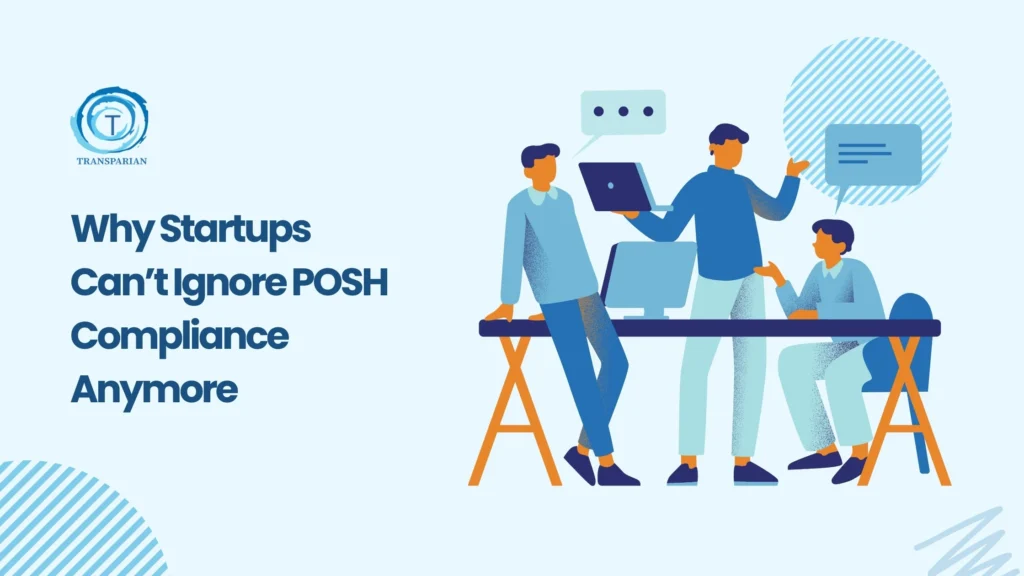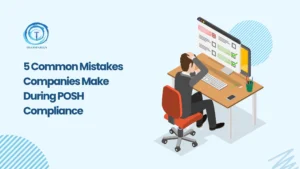The Indian startup ecosystem is one of the fastest-growing in the world, but with growth comes responsibility. While founders focus on fundraising, hiring talent, and building products, there is one critical area they often underestimate PoSH compliance. The Prevention of Sexual Harassment (POSH) Act, 2013 mandates that every workplace must have policies, processes, and committees in place to ensure a safe working environment. For startups, ignoring this is not just a legal risk but also a threat to reputation, culture, and long-term sustainability.
Understanding the Foundation of PoSH Compliance
At its core, POSH compliance for startups means establishing a safe and inclusive workplace. The law requires an anti-sexual harassment policy, the creation of a posh committee (technically called the Internal Complaints Committee), mandatory posh training for employees, and the filing of an Annual POSH report filing with the authorities.
Startups, regardless of their size, cannot argue that they are too small to comply. The law applies to all registered entities with more than 10 employees, including contractors, interns, and gig workers. Even if a startup is lean today, early adoption of workplace safety policies sends a strong message to employees and investors that leadership prioritizes dignity and compliance.
Why Startups Face Unique POSH Challenges
Large companies often have compliance teams and in-house HR departments. Startups, on the other hand, are usually resource-constrained and focused on immediate growth metrics. This creates gaps such as:
- Lack of awareness of POSH guidelines for employers.
- Absence of dedicated HR to design workplace harassment policies.
- Minimal or ad hoc posh training documentation.
- Ignorance about the need for a trained posh consultant or external committee member.
These gaps can lead to serious consequences, from employee attrition to legal penalties. Investors increasingly expect startups to demonstrate readiness with POSH audit checklist items as part of due diligence.
Setting Up a POSH-Ready Workplace
For startups to comply effectively, they must treat PoSH training programs and committee formation as foundational tasks rather than afterthoughts. Here are the building blocks:
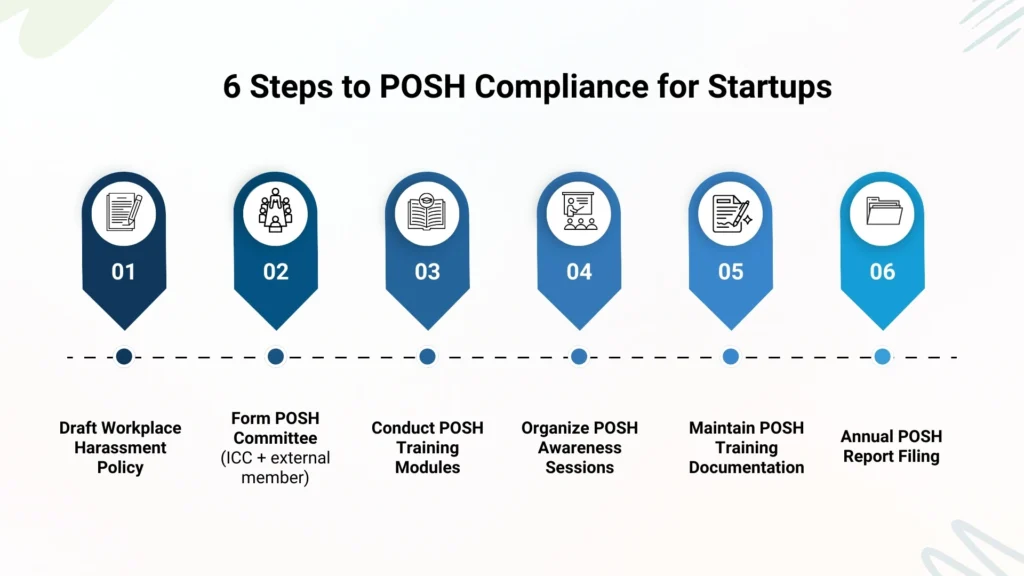
- Drafting an Anti-Sexual Harassment Policy
Every startup must draft and circulate a clear workplace harassment policy. This document should define harassment, explain reporting mechanisms, outline investigation processes, and specify penalties. - Creating the PoSH Committee
The posh committee must include at least one external member, usually a posh consultant, along with senior employees. Even in early-stage companies, this committee is mandatory. - Conducting POSH Training and Awareness
A startup should regularly organize posh training, posh workshop, and POSH awareness sessions so employees understand their rights and responsibilities. Managers should undergo specialized POSH training modules to handle complaints sensitively. - Maintaining Documentation
Every session, complaint, or awareness activity must be recorded. Maintaining proper posh training documentation helps protect startups legally and demonstrates seriousness during audits. - Annual Report Filing
Every employer must ensure Annual POSH report filing with the District Officer. Startups often miss this step, exposing themselves to fines or disqualification from government and corporate tenders.
The Missed Conversations Around PoSH
Most discussions stop at the legal basics, but startups face scenarios that require deeper attention:
1. Remote and Hybrid Teams
Startups often have employees working from co-working spaces or remotely across states. Workplace safety policies must cover digital communication, virtual meetings, and harassment via online platforms. A PoSH audit checklist should include how remote complaints are recorded and investigated.
2. Non-Employee Workers
Interns, freelancers, and vendors often contribute to startup teams. Under the law, these groups are protected too. A comprehensive anti-sexual harassment policy should clearly state how external contributors can raise complaints and how the posh committee will address them.
3. Investor and Market Expectations
Increasingly, investors ask whether startups have adopted POSH guidelines for employers before funding. A missing posh consultant or lack of PoSH training programs can be red flags during due diligence.
4. Low-Cost, Scalable Compliance
Many founders assume compliance is expensive. In reality, hiring an external posh company or posh consultant can be affordable compared to the reputational cost of ignoring compliance. Scalable, SaaS-driven POSH training modules and online posh workshop formats allow startups to train employees without big budgets.
5. Inclusive and Intersectional Policies
Traditional compliance frameworks often miss inclusivity. Startups can lead by designing workplace harassment policies that acknowledge LGBTQ+ employees, persons with disabilities, and diverse workforce needs. Training programs should address these realities within POSH awareness sessions.
Role of Training and Awareness
The most obvious aspect of compliance is training. It is also not sufficient to have a posh committee on paper, but employees must understand how to get in touch with it. POSH training for employees should focus on:
- Recognizing different forms of harassment.
- Explaining complaint processes and protections.
- Responsibilities of bystanders and managers.
- Dos and don’ts for workplace conduct.
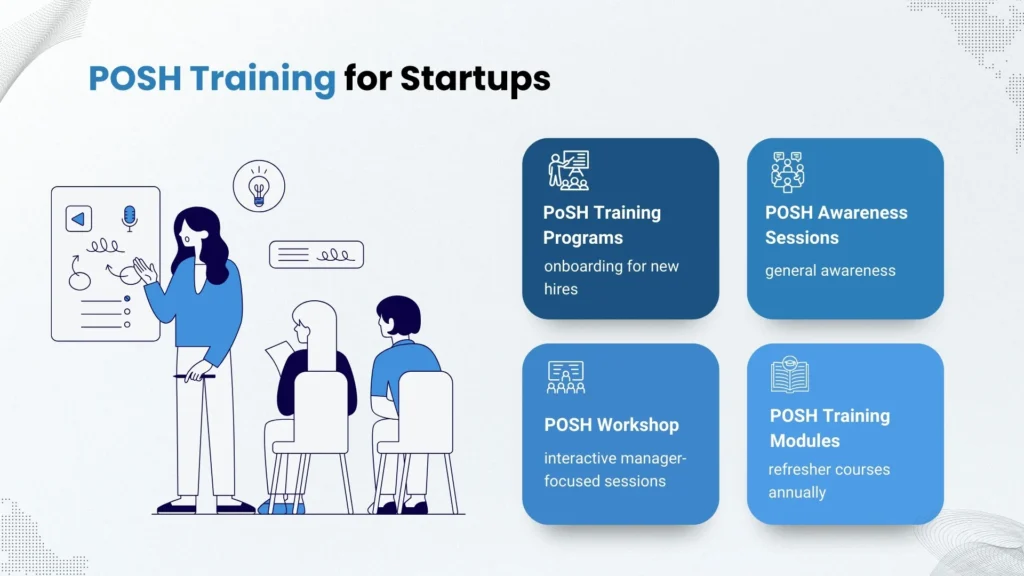
The PoSH training programs and workshops ought to be interactive. The role-plays or based on real-life scenarios can be used to strengthen learning in a posh workshop. Awareness programs about POSH should be organized periodically so that it is obvious that the leadership takes the workplace safety policies seriously.
Documentation and Reporting
Another common cause of failure during audits is that startups are unable to demonstrate compliance. It is important to keep up with fancy training records, attendance records, emails on policy circulation, and minutes of committee meetings to ensure that the startup can prove that it is serious. These records are also a reference point of the future scaling and congruent with the POSH audit checklist.
Measuring the Effectiveness of PoSH Initiatives
Startups are no longer meant to go through compliance checkboxes to determine impact. Useful metrics include:
- Number of employees trained through POSH training modules.
- Employee feedback on PoSH training programs.
- Awareness levels measured after POSH awareness sessions.
- Timeliness of complaint resolution by the posh committee.
- Successful Annual POSH report filing.
Investors, regulators or partners can be provided with this information as evidence of commitment.
Leveraging External Expertise
Most of the startups do not have in-house legal or HR. The collaboration with a fancy consultant or fancy company would make sure that compliance is not affected. These professionals assist in writing policies on workplace harassment, conduct posh workshops, direct posh committees, and the POSH audit checklist. Early outsourcing helps to save time, is legally safe, and is credible.
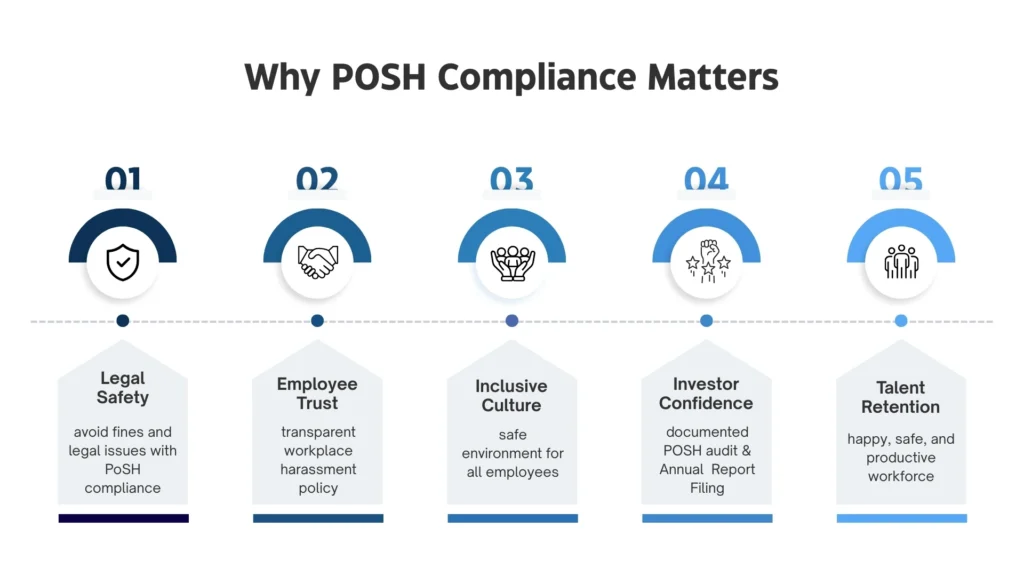
Embedding POSH Into Startup Culture
Finally, PoSH compliance is not a tick box exercise, but an attempt to make respect and accountability part of the culture. Startups who consider POSH guidelines to the employer send a message that they will not tolerate any form of misconduct. Workers feel safe, work efficiency will increase, and the organization will attract the best talent.
Building culture early is easier than repairing it later. When posh training for employees, strong workplace safety policies, and a transparent anti-sexual harassment policy become part of daily work, startups are better equipped to scale responsibly.
FAQ’s
Yes. Under the PoSH Act, every registered company with 10 or more employees must ensure PoSH compliance by forming a posh committee, drafting an anti-sexual harassment policy, and conducting regular posh training for employees.
Non-compliance can lead to fines, reputational damage, and even cancellation of business licenses. Startups also risk losing investors who now expect proof of POSH guidelines for employers during due diligence.
Induction, annual refreshers, quarterly POSH awareness sessions and scenario-based workshops work best.
Startups must maintain posh training documentation, ICC meeting minutes, policy circulation records, and proof of Annual POSH report filing with the District Officer.
Yes, all worker types, including gig, hybrid, and contract staff, fall under the POSH Act in 2025, policies must be extended accordingly.
A strong workplace harassment policy, active PoSH training programs, and transparent reporting processes create trust, safety, and inclusivity, which improves employee retention and productivity.

